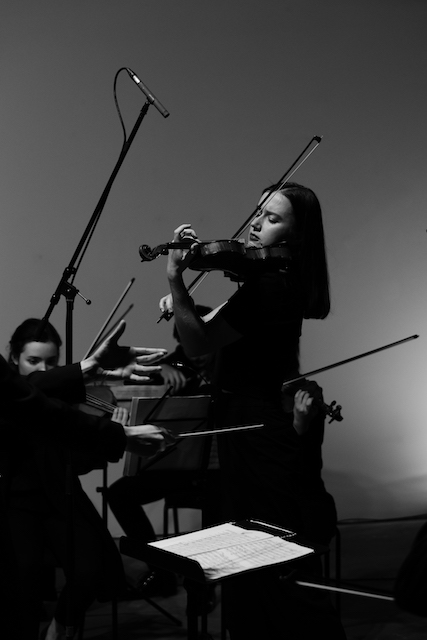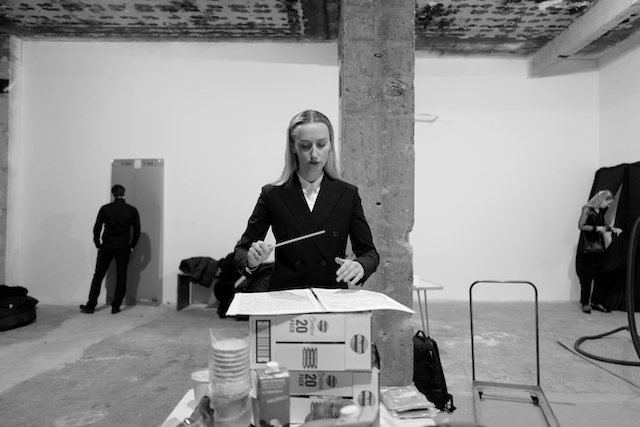Balanas Sisters, Anonimi Orchestra, The Bomb Factory, Marylebone review - talented Latvian conductor heads exciting new ensemble | reviews, news & interviews
Balanas Sisters, Anonimi Orchestra, The Bomb Factory, Marylebone review - talented Latvian conductor heads exciting new ensemble
Balanas Sisters, Anonimi Orchestra, The Bomb Factory, Marylebone review - talented Latvian conductor heads exciting new ensemble
The latest voice in the dialogue about what the future of classical music might look like
In an evening filled with "firsts" one of the many striking aspects was the effect the Anonimi Orchestra debut had on people walking past on the Marylebone Road. As we sat in the warehouse space of the Bomb Factory – with its exposed brick walls and large display windows – from time-to-time passers-by could be seen transfixed, gazing in at the vivacious ensemble bringing light to the January gloom.
The Anonimi Orchestra is the brainchild of Margarita Balanas, the cellist and conductor (main picture, and page bottom), one of three talented Latvian siblings who between them have collaborated with everyone from Anna-Sophie Mutter to Elton John. The self-deprecating name of the orchestra references their philosophy of putting the music before anything else; what this means in practice is a commitment to taking music out into the community and collaborating with innovative new composers. (A fascinating-sounding Carnival of Extinct Animals is in the works.)
The opening of the concert was Mozart’s Adagio and Fugue in C minor, originally composed for string quartet after Mozart had spent an intense period studying Bach’s contrapuntal style. For this first item, the orchestra alternated between magisterial dignity and whispery yearning in the opening Adagio before dispatching the Fugue with muscular elegance. Occasionally it felt that excitement and intensity were sacrificed for discipline and rigour. But the crescendo towards the conclusion was genuinely thrilling and showed what this orchestra could be like at full throttle.
The centrepiece was Mendelssohn’s Violin Concerto in D (as opposed to the more famous Concerto in E), a work written when he was 13 that was rediscovered by Yehudi Menuhin in the 1950s. It was a nice piece of programming, since at the point that Mendelssohn wrote this concerto he was widely considered to be a prodigy comparable only to Mozart. Though the overall tone is distinctively romantic, in the opening Allegro movement especially it’s possible to hear the intellectual dialogue Mendelssohn was having with Mozart in the arch wit and deft virtuosic flourishes. The way it’s performed is crucial, since it can make the difference between whether it comes across as a definitive work in its own right or simply an interesting piece of juvenilia.
 Luckily Margarita could call on her sister, the 33-year-old Kristine Balanas (pictured right, image by Kevin Kremer), who has already been praised by one broadsheet critic for her “eye-popping virtuosity”. (Her brother, Roberts, presumably would have been another option – he was only present as a cameraman and organiser for the evening, but he too is an astonishingly versatile violinist, as those who have seen him perform as a soloist will know.) As Roberts joined the passers-by on the Marylebone Road to film the concert through the windows, Kristine took centre-stage and the evening swung into a new gear. She demonstrated a resonant authority from the very first note, and the orchestra responded with vigour and agility.
Luckily Margarita could call on her sister, the 33-year-old Kristine Balanas (pictured right, image by Kevin Kremer), who has already been praised by one broadsheet critic for her “eye-popping virtuosity”. (Her brother, Roberts, presumably would have been another option – he was only present as a cameraman and organiser for the evening, but he too is an astonishingly versatile violinist, as those who have seen him perform as a soloist will know.) As Roberts joined the passers-by on the Marylebone Road to film the concert through the windows, Kristine took centre-stage and the evening swung into a new gear. She demonstrated a resonant authority from the very first note, and the orchestra responded with vigour and agility.
One of the unique features of the Marylebone Bomb Factory is that as an audience member you feel very much part of the cityscape that surrounds the venue. When you’re listening to the music, the number 2 and number 453 buses glide by, emerging like giant red sea monsters from the black of the night. As Kristine alternated between fleet fingered dynamism and Boadicean grandeur in the first movement it felt as if the traffic and people outside became part of the overall effect. (Though not in terms of noise, it should be emphasised.) The multiple reflections in the large windows heightened this sense: at one point it looked as if the people standing at the back of the hall were clustered on the pavement on the other side of the street.
In the Andante movement Kristine brought out both the elegance and sweet anguish of Mendelssohn’s vision, giving us a strong sense of the man who would go on to write the E minor concerto. In the arpeggiated sequences especially she brought out a gold-hued lyricism that held the audience spellbound. Then in the final Allegro she brought a more tempestuous energy to the music (making this critic wonder whether Storm Mendelssohn might be usefully added to our meteorologists’ ever-expanding name book). The flawlessly executed runs were superbly articulated as she skilfully ramped up the tension.
A surprise addition to the programme came with the Meditation from Massenet’s Thaïs, in which the whole auditorium seemed to resonate as the chords of the harp were supported by a sustained hum from the orchestra. It’s an easy crowd-pleaser, but again Kristine demonstrated her mettle as she balanced the soul-swooping upper melodies with grit and resolve in the lower passages.
The final work, Mahler’s Adagietto from Symphony No. 5, was a little ragged to start off with, but quickly picked up pace. This is a piece that has become famous through Leonard Bernstein’s interpretation for Robert Kennedy’s funeral, but far from being an expression of grief, it was originally written as a declaration of love for Alma, who he would later marry. The Anonimi Orchestra’s performance clung closely to the original spirit of the work, building from the sustained emotion of the beginning to full ecstatic fury. It rounded off a highly promising evening for a youthful ensemble with a dynamic vision that represents another exciting voice in the dialogue about what classical performance might look like for the future.
rating
Share this article
The future of Arts Journalism
You can stop theartsdesk.com closing!
We urgently need financing to survive. Our fundraising drive has thus far raised £49,000 but we need to reach £100,000 or we will be forced to close. Please contribute here: https://gofund.me/c3f6033d
And if you can forward this information to anyone who might assist, we’d be grateful.

Subscribe to theartsdesk.com
Thank you for continuing to read our work on theartsdesk.com. For unlimited access to every article in its entirety, including our archive of more than 15,000 pieces, we're asking for £5 per month or £40 per year. We feel it's a very good deal, and hope you do too.
To take a subscription now simply click here.
And if you're looking for that extra gift for a friend or family member, why not treat them to a theartsdesk.com gift subscription?
more Classical music
 Bizet in 150th anniversary year: rich and rare French offerings from Palazzetto Bru Zane
Specialists in French romantic music unveil a treasure trove both live and on disc
Bizet in 150th anniversary year: rich and rare French offerings from Palazzetto Bru Zane
Specialists in French romantic music unveil a treasure trove both live and on disc
 Scottish Chamber Orchestra, Ibragimova, Queen’s Hall, Edinburgh review - rarities, novelties and drumrolls
A pity the SCO didn't pick a better showcase for a shining guest artist
Scottish Chamber Orchestra, Ibragimova, Queen’s Hall, Edinburgh review - rarities, novelties and drumrolls
A pity the SCO didn't pick a better showcase for a shining guest artist
 Kilsby, Parkes, Sinfonia of London, Wilson, Barbican review - string things zing and sing in expert hands
British masterpieces for strings plus other-worldly tenor and horn - and a muscular rarity
Kilsby, Parkes, Sinfonia of London, Wilson, Barbican review - string things zing and sing in expert hands
British masterpieces for strings plus other-worldly tenor and horn - and a muscular rarity
 From Historical to Hip-Hop, Classically Black Music Festival, Kings Place review - a cluster of impressive stars for the future
From quasi-Mozartian elegance to the gritty humour of a kitchen inspection
From Historical to Hip-Hop, Classically Black Music Festival, Kings Place review - a cluster of impressive stars for the future
From quasi-Mozartian elegance to the gritty humour of a kitchen inspection
 Shibe, LSO, Adès, Barbican review - gaudy and glorious new music alongside serene Sibelius
Adès’s passion makes persuasive case for the music he loves, both new and old
Shibe, LSO, Adès, Barbican review - gaudy and glorious new music alongside serene Sibelius
Adès’s passion makes persuasive case for the music he loves, both new and old
 Anja Mittermüller, Richard Fu, Wigmore Hall review - a glorious hall debut
The Austrian mezzo shines - at the age of 22
Anja Mittermüller, Richard Fu, Wigmore Hall review - a glorious hall debut
The Austrian mezzo shines - at the age of 22
 First Person: clarinettist Oliver Pashley on the new horizons of The Hermes Experiment's latest album
Compositions by members of this unusual quartet feature for the first time
First Person: clarinettist Oliver Pashley on the new horizons of The Hermes Experiment's latest album
Compositions by members of this unusual quartet feature for the first time
 Gesualdo Passione, Les Arts Florissants, Amala Dior Company, Barbican review - inspired collaboration excavates the music's humanity
At times it was like watching an anarchic religious procession
Gesualdo Passione, Les Arts Florissants, Amala Dior Company, Barbican review - inspired collaboration excavates the music's humanity
At times it was like watching an anarchic religious procession
 Classical CDs: Camels, concrete and cabaret
An influential American composer's 90th birthday box, plus British piano concertos and a father-and-son duo
Classical CDs: Camels, concrete and cabaret
An influential American composer's 90th birthday box, plus British piano concertos and a father-and-son duo
 Cockerham, Manchester Camerata, Sheen, Martin Harris Centre, Manchester review - re-enacting the dawn of modernism
Two UK premieres added to three miniatures from a seminal event of January 1914
Cockerham, Manchester Camerata, Sheen, Martin Harris Centre, Manchester review - re-enacting the dawn of modernism
Two UK premieres added to three miniatures from a seminal event of January 1914
 Kempf, Brno Philharmonic, Davies, Bridgewater Hall, Manchester review - European tradition meets American jazz
Bouncing Czechs enjoy their Gershwin and Brubeck alongside Janáček and Dvořák
Kempf, Brno Philharmonic, Davies, Bridgewater Hall, Manchester review - European tradition meets American jazz
Bouncing Czechs enjoy their Gershwin and Brubeck alongside Janáček and Dvořák
 Solomon, OAE, Butt, QEH review - daft Biblical whitewashing with great choruses
Even a top soprano and mezzo can’t make this Handel paean wholly convincing
Solomon, OAE, Butt, QEH review - daft Biblical whitewashing with great choruses
Even a top soprano and mezzo can’t make this Handel paean wholly convincing

Add comment